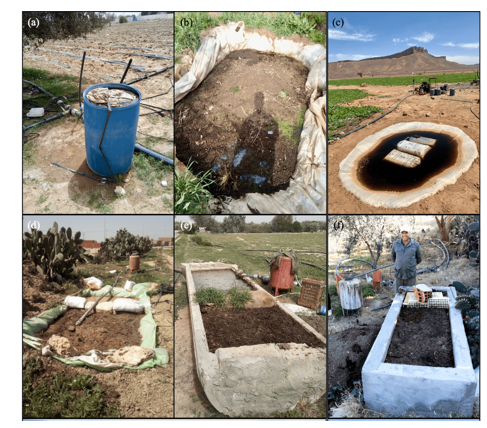The lens of agroecology has, to date, seldomly been used to study farming systems and cropping systems in North Africa, even the more in irrigated zones. Yet, agroecological practices are common within small-scale irrigated farming systems, although often undertaken in combination with more conventional practices.

© Photos : preparation of manure tea (Leauthaud et al. submitted)
In particular, one innovation that has spread with the use of drip-irrigation and fertigation strategies, is the use of manure-based teas, applied to various fruit and green market products. This bottom-up innovation remains mostly invisible to decision makers and researchers, while questions arise concerning its composition, agronomic effects as well as its interactions with the soil, and in the case of fertigation applications, its role on pipe and drip emitter clogging. This project aims to conduct original research bridging irrigation science - agronomy- soil science and participatory processes, within the framework of a collaboration between the two research units Eco&Sols and Geau.
The team will initiate a PhD-level research work, aimed at improving fertigation practices of farmers, by characterizing and co-experimenting with farmers improvement pathways of this locally existing innovative agroecological practice of artisanal manure-based tea extracts in irrigated agriculture in North Africa.
- What are the major physico-chemical and biological properties of artisanal manure teas?
- What are the impacts on soil physicochemical and biological properties, on crop growth and on the irrigation system?
- How, and in which conditions, can the implementation of participatory processes in co-learning lead to improved fertigation strategies of farmers, and in fine to more virtuous uses of organic liquid fertilizers?
- Undertake with farmers a participatory co-design process to initiate collaborative reflections on improvement of fertigation strategies, by (i) describing the use of manure tea by farmers, and (ii) implementing a set of workshops with the famers to co-design novel solutions. This will be implemented in two to three different sites in Tunisia.
- Uundertake experimental characterizations of (i) used manure teas, and its impact on the (ii) soil, cropping and (iii) irrigation systems.
Key words: manure teas, fertigation, irrigated agriculture, co-design processes, physicochemical and biological properties.






